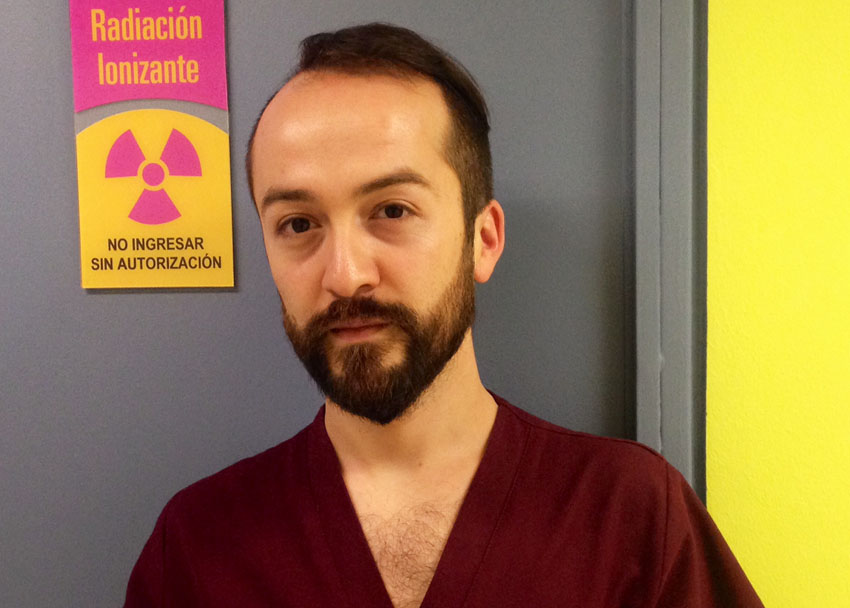Joseba Etxarri. Christian was born in Santiago, Chile, 32 years ago. Professionally he works at a clinic in the capital, after studying at the University of Chile to work with patients doing x-rays and scans.
-Where is Chile in relation to your specialty?
-In comparison with Latin America we are well positioned and people come to see us from Colombia, Ecuador, Peru, Bolivia... We are on par with our neighbors in Argentina.
-Your profession is part of the process in caring for cancer patients. Some may say that working with radiation wouldn’t be the best working environment.
-It is only a question of taking precautions and take the relevant measures and controls. I follow them and so I am not at risk. I like my work a lot, but yes it’s true that some patients are nervous or come hesitantly, for example, some have even fainted when we have to poke them. It only happens in a small number of cases, because fear and apprehension are free, but we are here to cure and treat people, and so of course, we maintain strict measures for the patients and ourselves as well.
-It’s amazing to find a Chilean who spells his last name, Etxeberria, like you with tx.
-In my case, it was my grandmother’s last name. She was the one who raised me and so I took her name as an adult. Actually she didn’t know that it was Basque, until one day I found out it was, and that in the language that was strange to me it meant new house. Little by little, I read and learned more about the Basques and I discovered some of their characteristics in my family. I also got more acquainted with Euskera and found out that its status in the Basque area was far from secure. This gave me courage and since then I have studied it closely and with affection. That is why I decided to spell my last name that way, here in Chile, in the Basque language that gives it meaning.
-You didn’t keep in touch with your Basque Country origins.
-Our family knowledge in Chile goes back to my great-grandparents. They were from Chile, in the Octava Region, between Los Angeles and the Andes mountains, an area where there are many Basques, and from what they tell me resembles the Basque Country a lot. But my family was reserved in that sense, and didn’t share a lot of information with us.
-In little more than two years you have gone from knowing nothing about Basque to acquiring a solid base, enough to take and teach classes.
-I am very motivated. In the beginning of 2012 I started Basque classes along with using online courses with the Boga program. I also introduced my daughter Julieta, who was 8 at the time, at weekly workshops at the Santiago Basque Club, with music and games. I would go with her and we would practice what we had learned as we came out. We played games in Basque and would play “Ikusi-Makusi”…Between one thing and another I improved and at the end of the year they gave me the opportunity to become part of the Euskara Munduan Program through HABE. That gives me both online and face-to-face training. The program 'Euskara Munduan' works with you four years, in hopes of turning students into teachers in their respective cities of clubs. And that’s what I’m doing.
-You were also in charge of the children’s workshops at the club and you do mintza-praktika, or oral Basque practice via Skype throught mintzanet.net with someone in the Basque country.
-It happened that the person in charge of these workshops at Eusko Etxea, Uxue, returned to Euskadi, and so they asked if I would take over the group. So since last year I have been creating the Basque workshops for children. My learning continues parallel. Normally I Skype with Izaskun, my “mintzalaguna” (conversation partner) in Lazkao, on Sundays. I can now say that we do function as friends to practice Euskera, but at the beginning when we were getting to know each other we were much more formal, but now we talk about whatever, vacation, work, news…
-You seem very satisfied…
-I wasn’t always, but it all changed when I realized that I was understanding more and more, and I was able to make myself understood in Basque.
-You’ve never been to the Basque Country.
-Not yet. My plan is to finish the “Euskara Munduan” program in the beginning of 2017 taking as much advantage as possible, and with that language base, to visit the country and maybe even give the barnetegi in Lazkao a shot.






 Send to a friend
Send to a friend Add comment
Add comment








